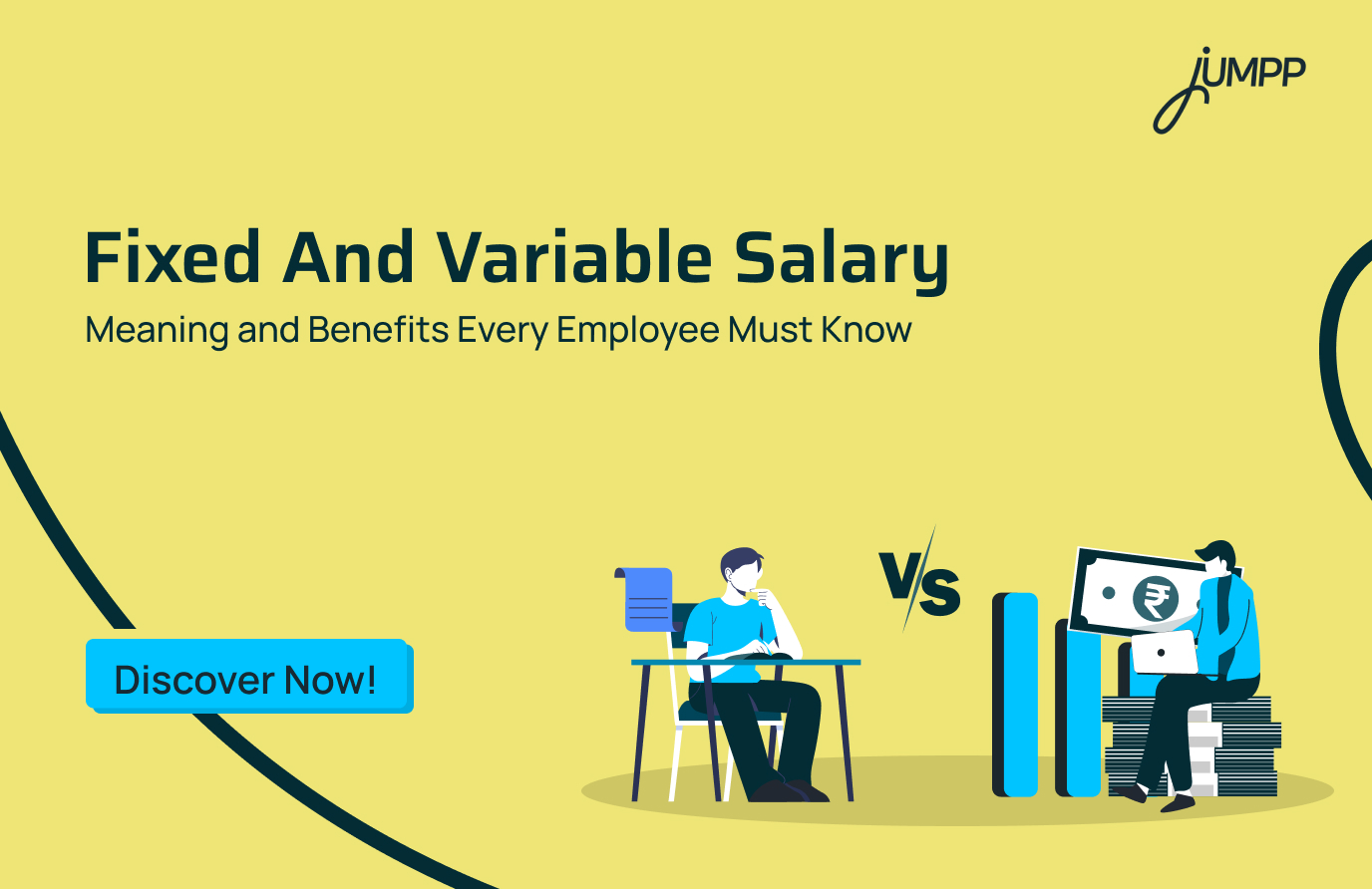What is the Difference Between Fixed and Variable Salary

Most people do not realise that their monthly remuneration usually has two components, fixed and variable salary. One creates stability and predictability, while the other brings possibility and performance-linked earnings.
Here is a clear way to understand the difference between fixed and variable salaries in India.
Fixed And Variable Salary Meaning
A fixed salary is a guaranteed and predictable amount of money that you receive at regular intervals, regardless of performance. It includes components such as basic pay and allowances, and remains constant throughout the year.
A variable salary is the part of your compensation that depends on performance and can change based on individual or company results through bonuses, commissions, or profit sharing. Together, fixed and variable salaries form the complete compensation package.
Want to understand the salary structure in detail? Read our complete guide on What is Remuneration to learn how companies calculate employee earnings.
What is the Difference Between Fixed And Variable Salary
| Feature | Fixed Salary | Variable Salary |
| Stability | High | Low |
| Performance Dependence | No | Yes |
| Predictability | Predictable | Unpredictable |
| Purpose | Financial security | Performance incentive |
| Typical Components | Basic pay and allowances | Bonuses and commissions |
What is a fixed salary?
A fixed salary is the predetermined and guaranteed amount of money an employee receives at regular intervals for their work, irrespective of performance or the organisation’s financial outcome
What are the components of a fixed salary?
- Basic Salary: This is the core amount within the salary structure and is used to calculate other allowances and deductions that apply.
- Dearness Allowance: This is a cost-of-living adjustment provided to help manage inflation, and it is commonly offered to government employees.
- House Rent Allowance: This allowance supports employees in meeting their housing expenses.
- Conveyance Allowance: This allowance covers travel-related costs incurred for work purposes, including daily commuting.
- Special Allowances: These are additional allowances decided by the organisation and may cover medical needs, education-related costs, or other employee benefits.
- Other fixed benefits: Some companies may also offer fixed benefits such as meal support or a work-from-home allowance.
What are the types of fixed salary?
A fixed salary is divided into a basic salary and various allowances. These can include Dearness Allowance, House Rent Allowance, conveyance allowance, and special allowances that differ across organisations. The total fixed salary is the sum of these components as explained above.
Also, learn how deductions affect your in-hand income. Check our detailed guide on professional tax on salary and see how it is calculated in India.
Pros And Cons Of Fixed Salary
| Basis | Pros of Fixed Salary | Cons of Fixed Salary |
| Financial impact | Provides financial stability and makes budgeting easier for employees | Offers lower earning potential compared to performance-based pay |
| Company budgeting | Helps companies maintain predictable and consistent labour expenses | Lacks flexibility since pay does not change with performance or business outcomes |
| Job security | Increases employee confidence and reduces financial stress due to guaranteed income | May reduce motivation to exceed expectations because achievements are not directly rewarded |
| Workplace culture | Reduces internal competition and supports collaboration among employees | It can make it harder to attract highly competitive or performance-driven talent |
| Work pressure | Removes pressure to work extra hours to increase income | May lead to lower engagement if employees do not feel incentivised to perform beyond targets |
What is variable salary?
Variable salary is the portion of an employee’s compensation that is not fixed and can change based on performance, goals, or other criteria.
It is usually paid as a bonus, commission, or incentive and is used by companies to motivate employees and align their efforts with organisational objectives. Variable pay is given in addition to a fixed base salary and may be disbursed quarterly, semiannually, or annually.
Types of Variable Salary
Types of variable salary refer to how the performance is measured, whether at the individual, team, or organisational level. These include performance-based bonuses, sales commissions, profit-sharing plans, and employee stock options, all of which are linked to the success of the employee, the team, or the company.
Individual-based variable pay
This type is directly connected to the performance and contribution of a single employee.
- Performance bonuses: One-time payments for exceeding targets or delivering exceptional results.
- Piece rate pay: Earnings calculated based on the number of units produced or tasks completed.
- Sales commissions: A percentage of the revenue generated from sales made by an individual.
- Incentive programmes: Monetary rewards given for achieving specific milestones.
Team-based variable pay
This type rewards a group for collective performance and supports collaboration.
- Gainsharing: A programme where employees receive a share of the financial gains that come from improved productivity or reduced costs.
- Goalsharing: Rewards given when a team or department achieves defined organisational goals, such as customer satisfaction targets.
Organisational-wide variable pay
This type is linked to the company’s overall performance and success.
- Profit sharing: Distributing a share of the company’s profits among employees.
- Employee stock plans: Providing company stock as a form of compensation or reward.
- Annual bonuses: A bonus paid once a year, often based on overall company profitability.
What are the pros and cons of variable salary?
| Basis | Pros of Variable Salary | Cons of Variable Salary |
| Earnings | Higher earning potential for employees who perform exceptionally well, allowing them to be rewarded for additional effort | Financial uncertainty due to fluctuating payouts, which can make budgeting difficult and create stress |
| Motivation and performance | Increases motivation and accountability by linking pay directly to performance and goal achievement | Risk of unhealthy competition when incentives are based on individual results, which can reduce teamwork and collaboration |
| Talent management | Supports employee retention by offering meaningful rewards and distinguishing high performers from others | Can encourage short-term thinking, where employees focus only on targets that trigger bonuses instead of broader responsibilities |
| Cost management for employers | Provides flexibility for companies to align labour costs with business performance, paying more in strong periods and saving during downturns | Administering a fair and transparent plan can be complex, and unclear goals or calculations may lead to dissatisfaction |
| Organisational alignment | Ensures individual and team efforts are connected to organisational objectives so everyone works towards the same goals | Misaligned or poorly communicated structures can negatively impact morale and trust within the organisation |
Conclusion
Understanding the difference between fixed and variable salary is essential for every working professional in India, especially as compensation structures continue to evolve with changing business needs. Fixed salary provides the foundation of financial security. Variable salary adds a layer of opportunity by rewarding performance and aligning individual efforts with wider organisational goals.
If certain goals cannot wait for your next pay cycle, explore the best online loan app offering quick approval, collateral-free borrowing, and transparent repayments!
Fixed and Variable Salary- FAQs
Variable pay can be beneficial because it offers higher earning potential based on performance. However, it can also create uncertainty since the amount is not guaranteed.
A mix of fixed and variable pay is usually the most practical because it balances security and reward. Variable pay can be better when performance is strong, as it allows employees to earn more than the fixed amount alone.
It means that four percent of your total salary is performance-linked and not guaranteed. The payout depends on meeting targets and can vary each cycle.
A fixed rate does not reward higher performance, which can limit motivation and earning potential. It also offers no flexibility for companies to adjust pay during strong or weak business periods.
Yes, most modern salary structures in India include both fixed and variable components. The fixed part offers monthly stability, while the variable part depends on performance or company results.
A fixed salary is the guaranteed amount of income an employee receives at regular intervals, regardless of performance or company results. It provides predictable monthly earnings through components such as basic pay and allowances.






